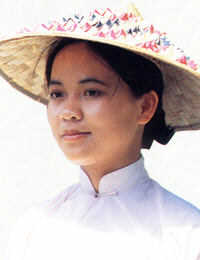 The Jing ethnic minority, with a small population of 18,915 (as of 1999), lives in compact communities primarily in the three islands of Wanwei, Wutou and Shanxin in the Fangcheng Multi-ethnic Autonomous County, the Guangxi Zhuang Autonomous Region, near the Sino-Vietnamese border. About one quarter of them live among the Han and Zhuang ethnic minorities in nearby counties and towns.
The Jing ethnic minority, with a small population of 18,915 (as of 1999), lives in compact communities primarily in the three islands of Wanwei, Wutou and Shanxin in the Fangcheng Multi-ethnic Autonomous County, the Guangxi Zhuang Autonomous Region, near the Sino-Vietnamese border. About one quarter of them live among the Han and Zhuang ethnic minorities in nearby counties and towns.
The Jing people had their own script which was called Zinan, created at the end of the 13th century and found in old song books and religious scriptures. They do not have their own language, and read and write in the Chinese language. They also speak the Cantonese dialect.
The ancestors of the Jings emigrated from Viet Nam to China in the early 16th century and first settled on the three uninhabited lands since the neighborhood had been populated by people of Han and Zhuang ethnic groups.
The Jing ethnic minority is engaged in fishing. Fish sauce is a favorite condiment the Jing people use in cooking, and a cake prepared with glutinous rice mixed with sesame is a great delicacy for them.
Many Jings are believers of Buddhism or Taoism, with a few followers of Catholicism. Ancestor worship prevails in this area. In addition, the Gods worshipped by the Jings are mainly related to the sea.
The Jing people like antiphonal songs which are melodious and lyrical. Their traditional instruments include the two-stringed fiddle, flute, drum, gong and the single-stringed fiddle, a unique musical instrument of the ethnic minority. Their favorite dances feature lanterns, fancy colored sticks, embroidery and dragons. Like the Hans, they also celebrate the Lunar New Year -- Spring Festival -- and the Dragon Boat Festival and the Mid-Autumn Festival.
Changha is one of Jing's most ceremonious festivals, which means sing in their language. They sing at Ha kiosk (a kind of wood house with images of ancestors in). During this period, they have all dolled up; greeting gods, ancestor worship and other activities will be hold.
